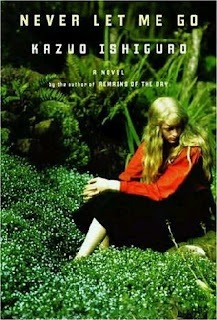 It didn't help of course that I knew the basic plot and was pretty "spoiled". It never does with Ishiguro. One is still unable to hold onto one's decorum and preserve a sense of self. Invariably and inevitably Ishiguro reels you into the lives of his characters may it be a butler motoring across England or a soul lost in the eastern theatre of World War II. You end up fighting their fights. Aching their aches.
It didn't help of course that I knew the basic plot and was pretty "spoiled". It never does with Ishiguro. One is still unable to hold onto one's decorum and preserve a sense of self. Invariably and inevitably Ishiguro reels you into the lives of his characters may it be a butler motoring across England or a soul lost in the eastern theatre of World War II. You end up fighting their fights. Aching their aches."Never Let Me Go" starts off very much like "Remains of the Day", with the seemingly random and harmless reminisces of the protagonist's time at an exclusive boarding school. But very soon one realises that this is a very different book tackling entirely new ground (for Ishiguro at least).
Among the series of dystopian novels that emerged around the same time (notably Atwood's The Handmaiden's Tale and Oryx and Crake), Never Let Me Go stands out in its restraint and subtlety.
And therein lies its strength (apart from the brilliant writing, of course). Not for Ishiguro the dreaming up of elaborate conceits of a future/parallel-world (although that does exist and proves the framework on which he hangs his tale). Rather he focuses on what he does best - portraying people and their interactions with each other in deft masterful strokes. And in doing so he performs a profound sleight of literary genius. By showcasing her innermost thoughts and actions Ishiguro gifts the protagonist her humanity in a world unwilling to afford her that status. By eliciting our horror to her life and tale he gives us, the readers, the continued assurance in ours.
It has been about two weeks since I finished the book and I still walk around with voices in my head railing at the injustices suffered by the "children" at the exclusive Hailsham School. Underlying it (I suppose) must be the fear that this could possibly be our future. And even more horrifying that it is a future I might have sanctioned in the very recent past (albeit with certain precautions and limitations). But mostly I walk around with a sense of utter and total gratitude that it is not our PRESENT and that decision making of this sort will perhaps fall to the next generation.
Passing the buck I know but do read the book and contact me if you would like to discuss what constitutes being "human" and having a "soul".
[Also posted on my Shelfari page]





